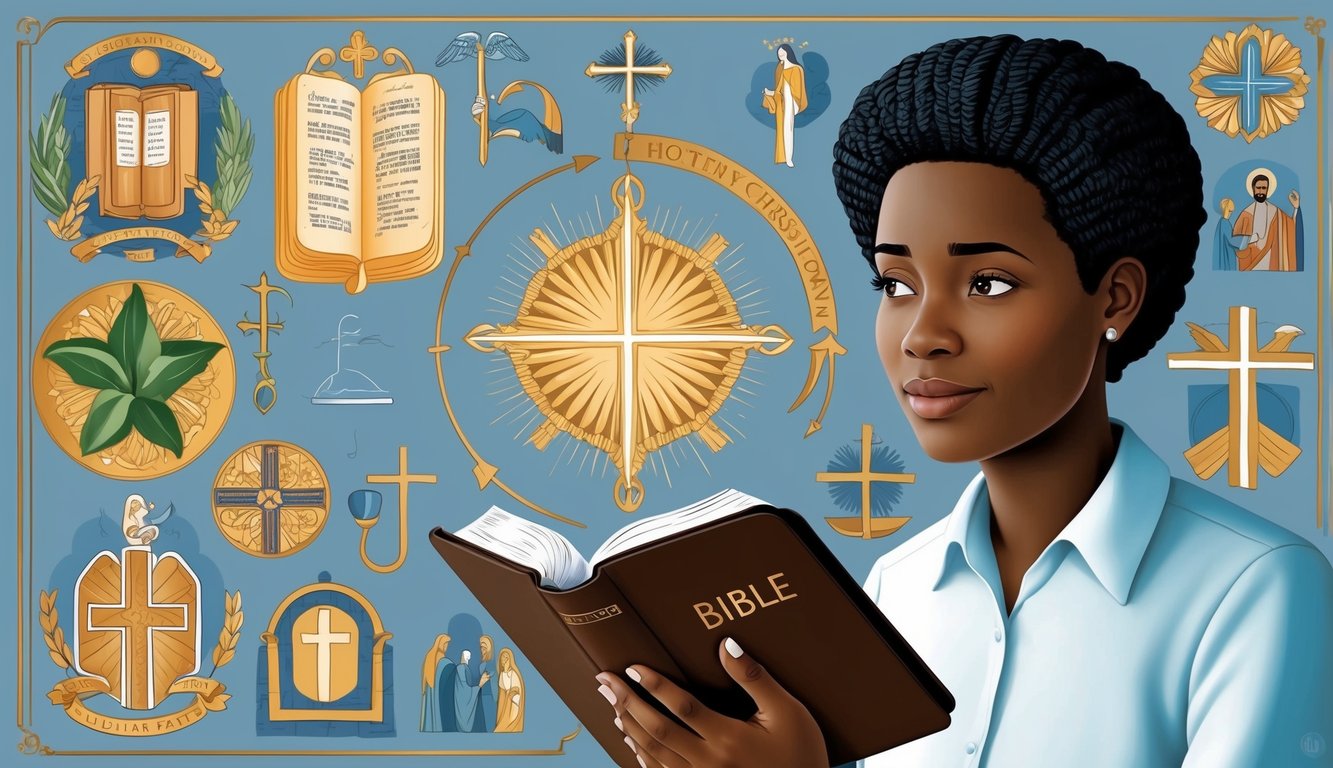Don’t Miss Out On This Unique Astrological Opportunity
Are you tired of spinning your wheels and getting nowhere? Simply put, you’re out of sync: you’re out of alignment with your astral configuration.
But: there’s a kind of map that can help you reclaim your alignment. Think of it as your own personal blueprint to success and happiness: a blueprint that will help you live your most amazing life.
Get started here.
Tattoos have become a popular form of self-expression, sparking curiosity about their place in religious contexts.
If you’ve ever wondered about tattoos from a biblical perspective, you’re not alone.
The Bible has a few passages that people often refer to when discussing body art. The most direct reference comes from Leviticus 19:28, which advises against tattooing the body as a part of ancient rituals.
You’ll find that interpretations of these passages vary.
Some people believe these guidelines are tied to specific cultural practices of the time rather than an outright ban on modern tattoos.
Meanwhile, others feel that this suggests a broader call for respecting the body.
For many Christians, it’s important to consider how these teachings align with personal beliefs and values.
This reflection often involves prayer, scripture study, and seeking guidance from spiritual mentors.
Exploring topics like Daniel Bible faith and prophecy can provide deeper insight into God’s plans and strengthen one’s spiritual journey.
Applying these teachings to daily life helps believers grow in their faith and remain steadfast in their values.
Whether you’re considering your first tattoo or just curious about the subject, exploring how tattoos fit within your spiritual path can be enlightening.
Understanding diverse perspectives and engaging with others on this topic may lead you to a deeper appreciation of both your faith and individual expression.
Biblical Passages on Body Modifications
The Bible mentions body modifications in various contexts.
Two key areas are tattooing in Leviticus 19:28 and broader markings in ancient cultures.
These passages reveal cultural and religious beliefs in Israelite contexts.
Leviticus 19:28 and Its Interpretation
Leviticus 19:28 states, “You shall not make any cuts on your body for the dead or tattoo yourselves: I am the Lord.” This verse is significant for Christians when discussing tattoos and body modifications.
Here, the focus is on avoiding marks made in rituals for the dead.
This concern reflects practices common in surrounding cultures like Canaan and Egypt.
The phrase “I am the Lord” emphasizes the religious seriousness.
It suggests that such practices might distract from devotion to God.
Markings of Canaan and Egypt
In ancient Canaan and Egypt, body markings were a part of cultural rituals and religious identity.
People often tattooed or scarred themselves as part of worship or mourning for the deceased.
This context is crucial when considering Leviticus 19:28.
The Israelites were keen to distinguish themselves from nearby nations.
Markings tied to religious practices of these nations might have conflicted with the command to maintain a unique identity.
This passage encourages reflecting on what these practices represent spiritually and culturally.
New Testament Insights
While the New Testament doesn’t directly address tattoos, passages like 1 Corinthians 6:19-20 offer broader perspectives on body modifications.
This scripture mentions that your body is a temple of the Holy Spirit.
Therefore, maintaining respect and care for your body is essential.
The focus here is on how you live out your faith through your actions, choices, and self-expression.
While body modifications like tattoos aren’t explicitly mentioned, the principle of honoring God with your body can guide decisions.
Balancing personal expression with spiritual values helps shape your understanding in modern contexts.
Theological Perspectives on Tattoos
When considering tattoos and Christianity, many wonder what the Bible says about body modifications.
Discussions often center on faith, sin, and how tattoos might affect one’s relationship with God.
Tattoos and Christian Faith
For many Christians, tattoos can be a reflection of personal faith or beliefs.
Some view them as a form of worship or an expression of devotion.
For example, some might choose to have tattoos featuring biblical verses or symbols, connecting their skin art to their spiritual life.
The Bible doesn’t provide explicit instructions on tattoos.
In Leviticus 19:28, it advises against body markings, but this was in the context of pagan rituals, not modern practices.
This creates a space for personal conviction.
What matters most to many believers is the intention behind the tattoo.
Are you getting it to honor God, to express your faith, or for other personal reasons?
Sin, Salvation, and Skin
There’s a common debate about whether tattoos are sinful.
Some might argue that marking the flesh is against God’s design, while others believe that, under the New Covenant, such practices don’t affect one’s salvation.
The apostle Paul, in 1 Corinthians 10:31, reminds Christians to do all things for the glory of God.
Whether that includes tattoos can be a personal decision.
Another interesting point from Revelation 19:16 is the image of Jesus with a name written on his thigh, which some interpret as a symbol that could resemble a tattoo.
Ultimately, while concerns about sin and tattoos vary, the focus often shifts to one’s relationship with God and intentions behind the markings.
Culture and Historical Context

Throughout history, tattoos have played significant roles in various cultures.
In ancient times, tattoos were used for rituals and as symbols of status or loyalty.
In today’s world, tattoos have gained popularity as a form of self-expression and art.
Tattooing in Ancient Cultures
In ancient Egypt, tattoos were often found on women and were linked to fertility rites and protection during childbirth.
These designs were symbols of devotion to certain gods, like the Goddess of Love and fertility.
Tattoos were also present in ancient Canaan, where they sometimes represented allegiance.
For slaves, tattoos marked ownership or identity.
This was a practice connected with the God of Israel to distinguish the faithful from those who followed Baal.
It was also tied to warnings against witchcraft and idolatry, expressed in biblical teachings.
Modern Popularity of Tattoos
Today, tattoos are widely recognized in many societies.
They have become a popular means of personal expression, often showcasing one’s interests, loved ones, or significant life events.
In the past, they were sometimes linked to rebellion or nonconformity, but mainstream acceptance has grown.
Young people, including those in Christian communities, may view tattoos as trendy.
While some still see them as controversial due to biblical teachings on sexual immorality, the stigma has diminished over time.
Despite varied opinions, the artistic and expressive potential of tattoos continues to flourish in modern culture.
Christian Practice and Personal Decision

When considering tattoos through the lens of Christian belief, it’s essential to reflect on both treating your body as a sacred space and making choices with faith and freedom in mind.
Body as the Temple of the Holy Spirit
The Bible encourages you to see your body as a temple of the Holy Spirit.
This idea is emphasized in 1 Corinthians 6:19-20, where believers are reminded to honor God with their bodies.
Considering a tattoo involves reflecting on whether it respects your body as a temple.
Although tattoos are permanent, not all interpretations view them negatively.
Some might see them as symbols of faith, while others consider if they might serve as a stumbling block to others.
Making Decisions in Freedom and Faith
Christianity teaches that you have the freedom to make personal decisions, as explained in Romans 14 and 1 Corinthians 10:23.
These passages highlight evaluating if a choice is beneficial and constructive.
With tattoos, it’s about seeking what pleases the Lord, as noted in Ephesians 5:10.
When making a decision, it helps to weigh your motivations and consider if the tattoo aligns with your faith.
Different believers may see tattoos as a way to express their beliefs, while others might choose not to, based on their personal convictions.
Ethical and Social Considerations

When considering tattoos through a biblical lens, ethical and social questions arise about personal expression and community standards.
These topics are tied to individual choices and shared societal beliefs.
Social Implications and Personal Identity
Getting a tattoo can spark varied reactions within social and religious circles.
Many people see tattoos as a way of expressing personal identity, sharing their life’s journey or faith.
For Christians, a tattoo might symbolize a personal or spiritual belief.
Some church communities, however, may view tattoos negatively, seeing them as conflicting with spiritual teachings like those in 1 Corinthians 6:18, which advises against dishonoring the body.
Others argue that tattoos can be a meaningful part of a Christian’s witness, reflecting passages such as 2 Timothy 1:7’s acknowledgment of personal power and love.
Ethical Debates around Body Art
In discussions about tattoos, ethical questions often center around religious teachings.
Leviticus 19:28 is sometimes cited as a prohibition against tattoos: “Do not cut your bodies for the dead or put tattoo marks on yourselves.” This has historically led to a taboo against tattoos within some Christian circles.
Some argue that Romans 12:1’s call to present bodies as living sacrifices allows for personal decisions like body art, if done respectfully.
Ethical debates also include considerations from Romans 1:24, emphasizing the importance of following God’s principles.
Ultimately, the choice becomes a balance between personal expression and adherence to religious beliefs.



